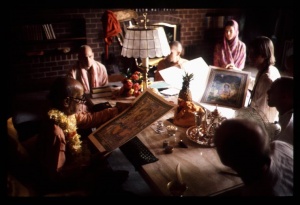SB 3.22.18

A.C. Bhaktivedanta Swami Prabhupada
TEXT 18
- tāṁ prārthayantīṁ lalanā-lalāmam
- asevita-śrī-caraṇair adṛṣṭām
- vatsāṁ manor uccapadaḥ svasāraṁ
- ko nānumanyeta budho 'bhiyātām
SYNONYMS
tām — her; prārthayantīm — seeking; lalanā-lalāmam — the ornament of women; asevita-śrī-caraṇaiḥ — by those who have not worshiped the feet of Lakṣmī; adṛṣṭām — not seen; vatsām — beloved daughter; manoḥ — of Svāyambhuva Manu; uccapadaḥ — of Uttānapāda; svasāram — sister; kaḥ — what; na anumanyeta — would not welcome; budhaḥ — wise man; abhiyātām — who has come of her own accord.
TRANSLATION
What wise man would not welcome her, the very ornament of womanhood, the beloved daughter of Svāyambhuva Manu and sister of Uttānapāda? Those who have not worshiped the gracious feet of the goddess of fortune cannot even perceive her, yet she has come of her own accord to seek my hand.
PURPORT
Kardama Muni praised the beauty and qualification of Devahūti in different ways. Devahūti was actually the ornament of all ornamented beautiful girls. A girl becomes beautiful by putting ornaments on her body, but Devahūti was more beautiful than the ornaments; she was considered the ornament of the ornamented beautiful girls. Demigods and Gandharvas were attracted by her beauty. Kardama Muni, although a great sage, was not a denizen of the heavenly planets, but it is mentioned in the previous verse that Viśvāvasu, who came from heaven, was also attracted by the beauty of Devahūti. Besides her personal beauty, she was the daughter of Emperor Svāyambhuva and sister of King Uttānapāda. Who could refuse the hand of such a girl?